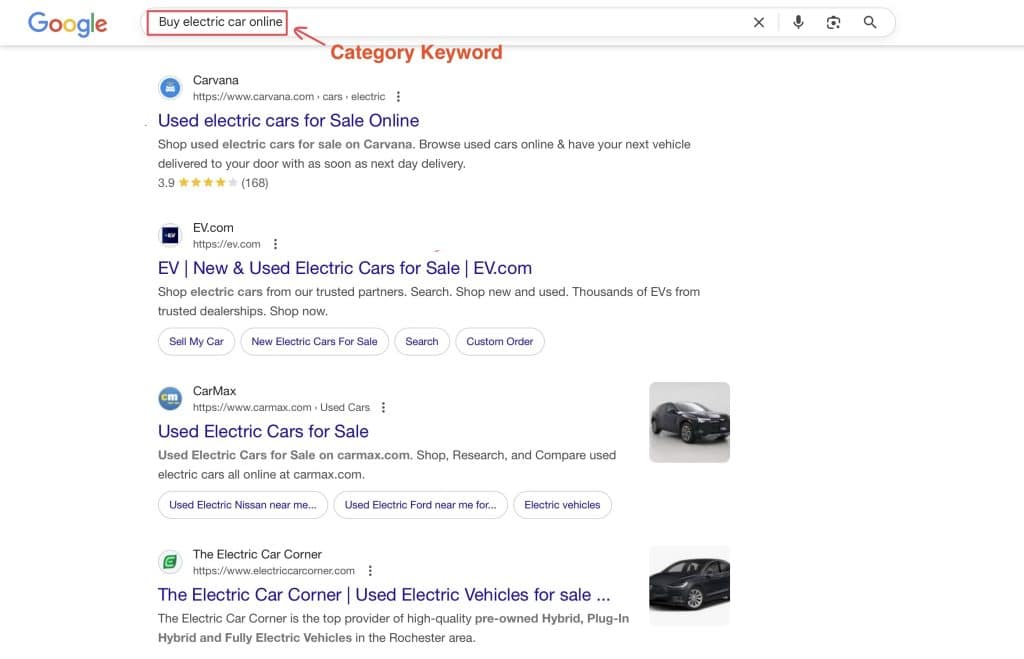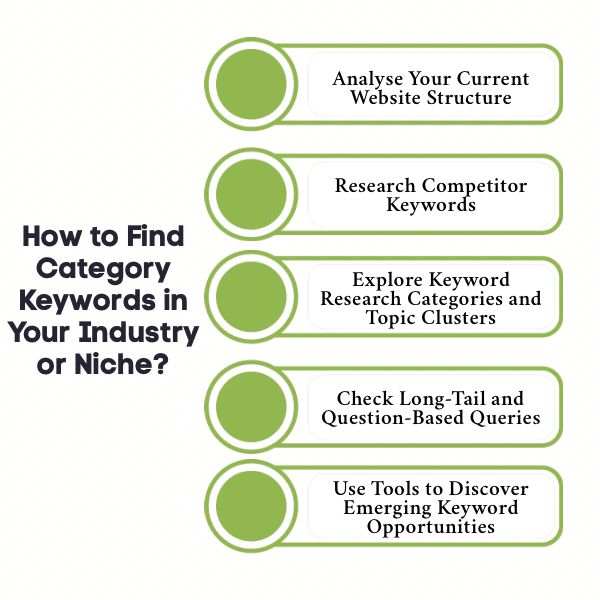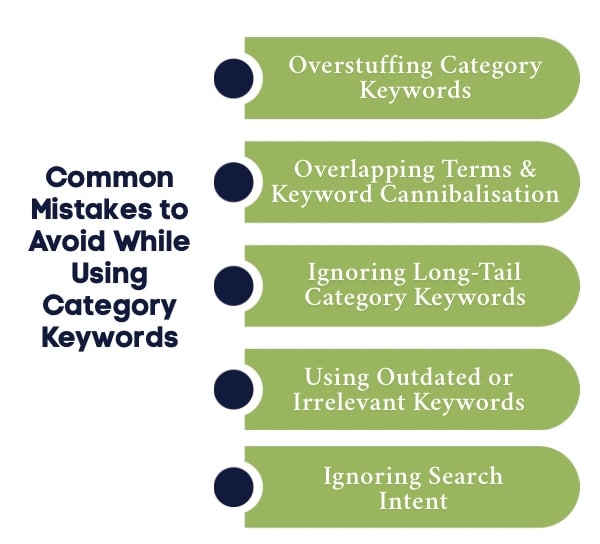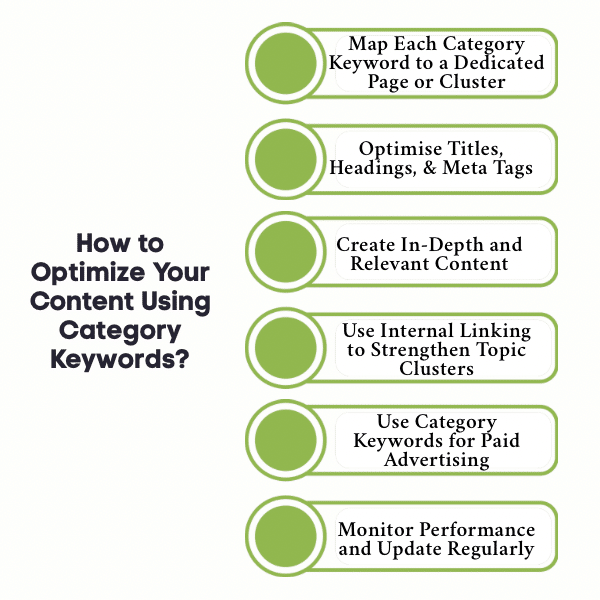TL;DR
- Category keywords are broad terms that define your website’s main topics and improve search engine understanding.
- Using them correctly boosts topical authority, organic traffic, and user experience.
- Analyse your site structure and competitors to identify strong category keywords.
- Build topic clusters and include long-tail or question-based variations to capture intent.
- Use tools like Google Keyword Planner, Google Trends, and AnswerThePublic to discover and track keywords.
- Avoid keyword stuffing, overlapping pages, outdated keywords, and ignoring search intent.
- Optimise titles, meta tags, and internal linking while creating in-depth, relevant content.
- Regularly monitor performance and refresh your keyword strategy to stay competitive.
- Wild Creek Web Studio can help you dominate search results through effective SEO strategies.
Struggling to get your website noticed despite publishing quality content? The problem might not be your writing; it could be your keywords. Category keywords are the backbone of search engine optimisation, helping search engines understand your website’s core topics and connecting you with your target audience.
Whether you run a blog, an eCommerce store, or a service-based website, identifying and using the right category keywords can improve your rankings, attract potential customers, and unlock new organic traffic opportunities. In this guide, we’ll break down what category keywords are, why they matter, and how to use them effectively for better results.
What are Category Keywords and Why Are They Important for SEO?

Category keyword example with SERP results
Category keywords are the main keywords that represent the primary topics or themes of your website. They are broader than long-tail keywords and usually cover a group of related keywords that fall under the same subject or category.
For example, in the travel industry, a website might focus on category keywords like “holiday packages,” “budget hotels,” or “family vacations,” which can then branch into multiple blog posts, guides, and landing pages targeting more specific search queries.
In SEO, category keywords are crucial because they help search engines understand your site structure and content focus. They also improve organic traffic, guide your content marketing efforts, and strengthen topical authority across search engine results.
How to Find Category Keywords in Your Industry or Niche?

An Infographic on How to Find Category Keywords in Your Industry or Niche
Finding the right keywords is the first step towards building topical authority and attracting the right audience to your website. Category keywords, when chosen strategically, not only strengthen your content strategy but also improve organic search visibility. Here’s how you can identify and leverage the most effective category keywords in your niche.
1. Analyse Your Current Website Structure
Start by reviewing your site’s structure and mapping out your existing topics and subtopics. Identify where natural category groupings already exist and create a keyword list for each section. This approach helps you uncover gaps and generate new keywords to target. A clear structure also improves the way search engines interpret your website hierarchy.
2. Research Competitor Keywords
Your competitors can be an excellent source of keyword ideas. Use keyword research tools such as Ahrefs or Semrush to analyse the search terms and related keywords driving their traffic. Look at which SERP features they occupy, like featured snippets, FAQs, or site links, and spot opportunities to outperform them. Competitor insights help you refine your own target keyword strategy.
3. Explore Keyword Research Categories and Topic Clusters
Effective SEO keyword research involves grouping keyword suggestions into meaningful clusters. Begin with seed keywords relevant to your niche and organise them into logical categories based on search intent. By creating topic clusters, you improve internal linking, make your product pages easier to navigate, and build topical authority in the eyes of search engines.
4. Check Long-Tail and Question-Based Queries
Long-tail keywords and user questions from Google Search, People Also Ask (PAA), Quora, and Reddit provide highly specific content ideas. These queries often indicate strong user intent and can generate qualified traffic. Incorporating such queries into your relevant content ensures your site resonates with both traditional search users and AI-powered platforms.
5. Use Tools to Discover Emerging Keyword Opportunities
Stay ahead of trends by leveraging tools like Google Trends, Google Keyword Planner, and AnswerThePublic. These free tools help you track monthly search volume, keyword difficulty, and emerging popular keywords. Combining competitor insights with fresh keyword suggestions ensures your keyword list remains updated and aligned with user behaviour.
What Tools Can Help Identify and Analyze Category Keywords?
Finding category keywords is easier with the right tools. These tools help discover keyword ideas, assess search terms, and improve organic search visibility.
Here are some of the most effective tools you can use to identify and analyse category keywords:
- Google Keyword Planner: Google Keyword Planner is a free tool within Google Ads to uncover new keywords, check monthly search volume, and analyse keyword difficulty for your SEO strategy.
- Google Search Console: Google Search Console shows which search terms bring traffic to your website, helping you refine your keyword list and improve ongoing SEO keyword research.
- Google Trends: Google Trends helps track popular keywords, seasonal spikes, and search patterns so you can align your content strategy with current search engine results.
- AnswerThePublic: AnswerThePublic generates question-based keyword suggestions and related keywords, making it easier to create topic clusters and publish relevant content.
- Social Media and Forums: Social media platforms like Reddit and Quora reveal trending discussions and real user queries, offering valuable content ideas for your SEO content and marketing strategy.
Using these tools ensures your category keywords remain updated, relevant, and effective for long-term search engine optimisation.
What are the Common Mistakes to Avoid While Using Category Keywords?

An Infographic on Common Mistakes to Avoid While Using Category Keywords
Even the best category keywords can underperform if used incorrectly. To maintain visibility and credibility in Google Search Console, avoid these common mistakes that many websites make:
1. Overstuffing Category Keywords
Repeating your target keyword too frequently makes your content look forced and can trigger search engine penalties. Readers also find overstuffed content disengaging. Focus on natural usage and blend in related keywords to maintain flow.
2. Overlapping Terms and Keyword Cannibalisation
When multiple pages target the same or very similar category keywords, organic search visibility suffers. Each target keyword should have a distinct page or content cluster to avoid confusion and ensure maximum ranking potential.
3. Ignoring Long-Tail Category Keywords
Relying solely on broad popular keywords can be limiting. Long-tail variations usually have lower keyword difficulty, align with specific intent, and can drive highly qualified traffic. Integrating them strengthens your SEO keyword research efforts.
4. Using Outdated or Irrelevant Keywords
Search behaviour evolves quickly. Outdated keywords can reduce engagement and rankings. Regularly refresh your keyword list using keyword research tools to find new keywords that reflect current search terms and trends.
5. Ignoring Search Intent
Even a high monthly search volume keyword can fail if it doesn’t match user intent. Understand whether users are looking for information, comparisons, or ready to make a purchase, and align your content strategy accordingly for better engagement and conversions.
How Can You Optimize Your Content Using Category Keywords?

An Infographic on How to Optimize Your Content Using Category Keywords
Finding category keywords is only the first step. Optimising your content around them is what drives visibility, organic traffic, and long-term success in search engine optimisation. A strong SEO strategy ensures your category keywords improve your search results while offering meaningful value to readers. Here’s how you can do it effectively:
1. Map Each Category Keyword to a Dedicated Page or Cluster
Assign each category keyword to a focused page or topic cluster rather than spreading it across multiple pages. This prevents confusion for search engines and users while ensuring your list of keywords is structured around clear topic hierarchies. It also improves your chances of ranking in search engine results features like sitelinks or People Also Ask.
2. Optimise Titles, Headings, and Meta Tags
Use your category keywords naturally in titles, meta descriptions, and headings to make your content discoverable. Pair your relevant keywords with secondary or long-tail terms to reach a broader audience. This approach works well for blog post optimisation, product pages, and landing pages, strengthening your seo content efforts.
3. Create In-Depth and Relevant Content
Search engines reward comprehensive, content-driven pages that address user intent fully. For each category keyword, create content that explores subtopics, FAQs, and comparisons. Combining this with Google Ads Insights or trending queries ensures your content remains competitive in high-intent search results.
4. Use Internal Linking to Strengthen Topic Clusters
Connect your category pages with related articles and supporting blogs. Strategic internal linking helps distribute page authority and improves user navigation, making it easier for readers and search engines to recognise your marketing strategy focus.
5. Use Category Keywords for Paid Advertising
Incorporate your category keywords into ads and social media campaigns to increase visibility among high-intent audiences. By aligning your SEO and PPC strategies, you can reinforce brand authority, improve click‑through rates, and gather keyword performance data that can also guide future content creation.
6. Monitor Performance and Update Regularly
Use a keyword tool like Ahrefs, SEMrush, or Google Keyword Planner to track performance and spot new opportunities. Analyse traffic in search engine results, refresh outdated sections, and align with social media trends to maintain relevance and attract qualified organic traffic over time.
What Are the Key Difference Between Category Keywords and Informational Keywords?
When planning an SEO strategy, it’s important to know the difference between category and informational keywords. The table below highlights their differences and why category keywords are more effective for driving conversions and building topical authority.
| Aspect | Category Keywords | Informational Keywords |
| Search Intent | Commercial; users are closer to making a purchase or enquiry. | Informational; users are looking for answers, guides, or research. |
| Example Keywords | “Buy electric car online,” “Men’s running shoes,” “Best CRM software for small business” | “What is an electric car,” “Benefits of running,” “How does CRM work” |
| Target Pages | Category pages, product listings, service pages, landing pages | Blogs, FAQs, guides, and knowledge articles |
| Conversion Potential | High; Users are ready to buy, enquire, or take the next step. | Low to Medium; Users are mostly researching or exploring options. |
| SEO Impact | Builds topical authority and drives qualified organic traffic faster. | Builds traffic and awareness but may take longer to convert. |
| Use in Paid Ads | Highly effective for Google Ads, Shopping Ads, and retargeting | Less effective unless part of a content‑driven campaign |
| Why More Effective | Category keywords capture high‑intent users and directly support revenue‑driving pages. | Informational keywords mainly serve awareness and education, not immediate conversions. |
While both keyword types are important for a balanced SEO strategy, category keywords are more effective for driving conversions and building topical authority faster. They reach high‑intent users, support revenue‑focused pages, and work seamlessly across SEO and paid advertising, making them vital for any growth‑oriented digital plan.
Turn Your Website into a Traffic Magnet with Wild Creek Web Studio
Want your website to dominate search results and become a traffic magnet? At Wild Creek Web Studio, we turn your content into a powerful growth engine. Our SEO strategies don’t just boost rankings; they build authority, attract the right audience, and drive real business results.
Whether it’s category keyword optimization, local search visibility, or advanced digital strategies, we help you stay ahead of the competition. Let us handle the complex SEO work so you can focus on growing your business.
Ready to boost your rankings? Contact us today to get started!
Conclusion
Mastering category keywords SEO is essential for building a strong search engine optimization strategy. By conducting thorough competitor analysis and monitoring performance with tools like Google Analytics, you can track what works. Optimising each title tag helps attract your target audience and convert potential customers.
Focusing on the right mix of category keywords, especially those with the highest search volume, improves your website’s ranking and drives relevant traffic. This approach also delivers a seamless experience for both users and search engines. Regularly updating your keyword strategy keeps your content competitive and visible.
Frequently Asked Questions
Can using too many category keywords be harmful to your SEO efforts?
Yes, overusing category keywords can harm your SEO. Keyword stuffing makes your content unnatural, reduces readability, and confuses search engines. Instead, use category keywords strategically, mix in long-tail variations, and focus on a natural flow to improve rankings and user experience.
How often should you update your category keywords strategy?
You should review and update your category keyword strategy every three to six months. Regular updates ensure your SEO content aligns with current search results, evolving marketing strategy, and user intent, helping maintain organic traffic and improve overall visibility.
How do you effectively research category keywords for your website?
To research category keywords effectively, start by analysing your website structure, studying competitor keywords, and using keyword research tools. Focus on related keywords, search intent, and organic search trends to create a targeted, high-performing keyword list.
How do category keywords impact user experience on a website?
Category keywords improve user experience by creating a clear website structure and guiding visitors to relevant contentquickly. When pages are organised around focused keywords, users can navigate easily, find what they need, and engage longer with your site.
Which is the best free keyword search tool?
Google Keyword Planner is the best free keyword search tool for beginners and businesses. It helps you discover new keywords, check monthly search volume, and analyse keyword difficulty, making it easier to plan an effective SEO strategy.
How do category keywords affect featured snippets?
Category keywords improve your chances of appearing in featured snippets by helping search engines understand your content’s relevance and structure. When your pages target clear search terms with organised SEO content, Google can extract concise answers for search engine results.
